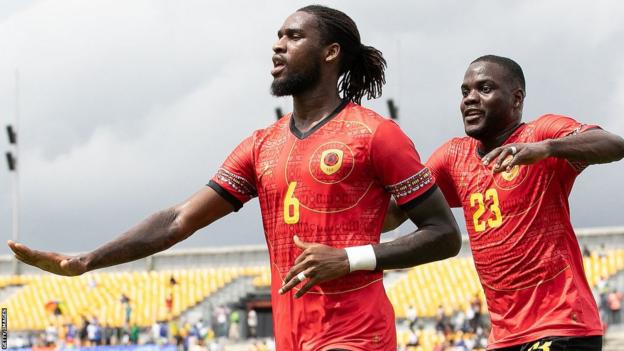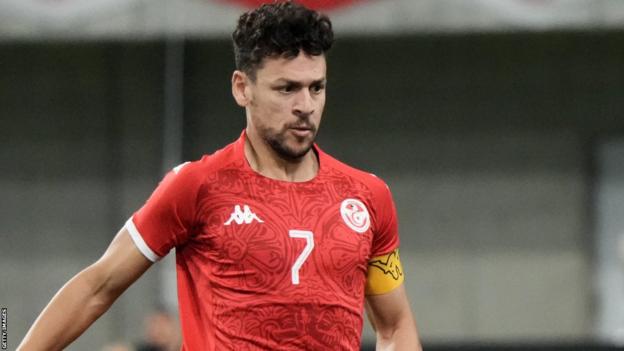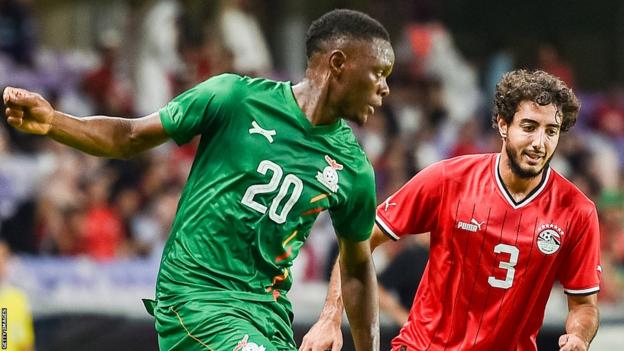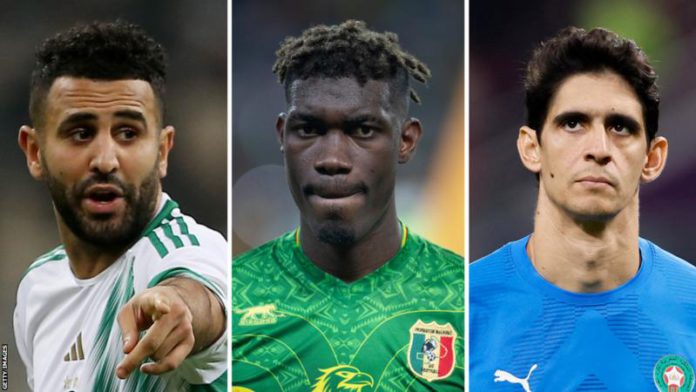After being shifted to early 2024 to avoid the rainy season in West Africa, the 2023 Africa Cup of Nations (Afcon) kicks off in Ivory Coast on 13 January.
Senegal are bidding to retain the title and the 24-team format means the top two from each group will progress to the knock-out stages, with the four best third-placed sides joining them.
The second half of the draw features the continent’s top-ranked side Morocco, who made history by becoming the first African nation to reach the World Cup semi-finals at Qatar 2022.
Defending champions Algeria suffered a surprise group-stage exit in Cameroon last time out and with South Africa, Tanzania and Zambia returning to the tournament, what can we expect from the 34th edition of the Nations Cup?
BBC Sport Africa has spoken to players and journalists to run the rule over Groups D, E and F.
Group D – Algeria, Burkina Faso, Mauritania and Angola
Algeria’s title defence at the 2021 Nations Cup did not go to plan and the past two years have been tough going for the North Africans, according to journalist Maher Mezahi.
“The Fennecs went to Cameroon surfing the highest of highs, just a couple of matches away from setting a new world record of 36 consecutive matches unbeaten,” he explains.
“Against all odds, Riyad Mahrez and co crashed out and failed to accomplish their lofty goals.
“Despite the early exit, coach Djamel Belmadi stuck with his nucleus of ageing players heading into 2022 World Cup play-offs. That decision did not pay off as Algeria suffered a heart-wrenching last-second elimination, sending shockwaves throughout the country that continue to reverberate.”
Belmadi decided to stay at the helm after months of deliberation. However, his rebuild remains a work in progress.
“He spent much of 2023 recruiting and blooding new faces and the much-needed fresh legs have rejuvenated the side, but it hasn’t translated into silky play,” Mezahi added.
“Belmadi hasn’t proved he knows his best starting XI. There remains a possibility things could click into place, but Algeria appear to be a team with talent but lacking a firm identity.”
Alongside Algeria are Burkina Faso, semi-finalists last time out, Mauritania and an Angola side who return for the first time since 2019.

Journalist Mark Gleeson sees “some potential” in the squad despite coach Pedro Goncalves battling with logistical issues and inconsistent selection.
“Goncalves can call up players in the top flight in Italy, Portugal and Turkey, and also the second division in France and Germany. There are also home-based players from Petro Atletico, who featured in the new African Football League,” Gleeson says.
“Angola will be targeting their matches against Mauritania and Burkina Faso to get them through to the knockout stages, but know their opener against Algeria is a tough start.”
Angola failed to score in their first two World Cup qualifiers with a weakened attack, and Goncalves has convinced Fiorentina striker M’bala Nzola to return but fellow forwards Helder Costa and Ivan Cavaleiro will not travel to West Africa.
Costa, released by Leeds in October, has been omitted because of his lack of club action while Cavaleiro – who is yet to turn out for Angola since switching his allegiance from Portugal – asked not to be considered because he has struggled with injury at Lille this season.
Group D fixtures
- Monday, 15 January: Algeria v Angola
- Tuesday,16 January: Burkina Faso v Mauritania
- Saturday, 20 January: Algeria v Burkina Faso, Mauritania v Angola
- Tuesday, 23 January: Angola v Burkina Faso, Mauritania v Algeria
Group E – Tunisia, Mali, South Africa and Namibia

Tunisia are Africa’s third-ranked side and have remained “resolute” in their preparations despite unrest off the field, says journalist Souhail Khmira.
“The Carthage Eagles are navigating a difficult time after the detention of football federation (FTF) president Wadie Jary in October on corruption-related allegations,” he adds.
“There were even rumours FTF board members would resign and suspend all footballing activities during this turbulence, but there was an unexpected turnaround.
“The team, motivated by the proverb ‘The light inside is broken, but I still work’, has been unfazed by the controversies and kept producing excellent results despite mediocre performances.”
Tunisia have made a perfect start in World Cup qualifying and are “bolstered by the fervour of their supporters” as they look to add to the title they won in 2004 on home soil.
“In the midst of turmoil, the Carthage Eagles stand united,” Khmira said. “The team shows courage in the face of difficulty, demonstrating their enduring spirit.”
Mali narrowly missed out against Tunisia for a spot at the World Cup in Qatar, while Namibia and 1996 champions South Africa are back after missing out on the 2021 edition.
“After failing to qualify for four of the past seven tournaments, progress to the second round would be a sign of progress for Bafana Bafana,” journalist Mo Allie said.
“Hugo Broos has fond memories of the last time he coached at a Nations Cup, when his unheralded Cameroon side won the 2017 tournament against expectations, and the 71-year-old Belgian has certainly improved the side since taking the reins in May 2021.
“A home win over Morocco in June and an away draw against Ivory Coast in October shows Broos’ charges have the capacity to be competitive against the big guns.
“However, their shock 2-0 loss against Rwanda in a World Cup qualifier in late November provided a valuable reality check about the side’s defensive vulnerabilities and their mental toughness in the face of adversity.”
Group E fixtures
- Tuesday, 16 January: Tunisia v Namibia, Mali v South Africa
- Saturday, 20 January: Tunisia v Mali
- Sunday, 21 January: South Africa v Namibia
- Wednesday, 24 January: South Africa v Tunisia, Namibia v Mali
Group F – Morocco, DR Congo, Zambia and Tanzania

Morocco are Africa’s top dogs following their run at Qatar 2022 and, along with success across the youth, club and women’s game, is “perhaps in its best era” according to journalist Amine El Amri.
“The Atlas Lions look like a natural favourite to win Afcon, but the hype of being the first ever African side to reach the World Cup semi-finals could mean an additional source of pressure,” El Amri says.
“The other difficulty could be the climate in Ivory Coast where humidity and heat can be very high – particularly for a group of players who have spent most of their careers in Europe.”
Meanwhile, it is closing in on 50 years since the North Africans won their sole Nations Cup title in Ethiopia in 1976.
“The main goal for Morocco is undoubtedly the title that has been a mere dream for the past five decades.
“Many Moroccans have no memory of 1976. The 2023 Afcon could be the opportunity to give the current generation something to commemorate, just like the adventure in Qatar 2022.”
DR Congo, winners in previous guises back in 1968 and 1974, and Tanzania, who have qualified for the finals for the third time, were both absent from the 2021 edition alongside Zambia.
The Chipolopolo have missed the past three Afcon finals and striker Patson Daka says it is “a dream come true” to return to the continental showpiece with the 2012 winners.
“To be part of this group that has made it possible for Zambia to return to where it belongs is a great achievement,” the 25-year-old said.
The Leicester City man is not fazed by facing two local derbies and Morocco, who are also in their 2026 World Cup qualifying group.
“We live for such challenges and for such moments,” Daka added.
“We’re going there as contenders – to fight and to bring pride again to our country. We believe as a group that everything is possible.”
Group F fixtures
- Wednesday, 17 January: Morocco v Tanzania, DR Congo v Zambia
- Sunday, 21 January: Morocco v DR Congo, Zambia v Tanzania
- Wednesday, 24 January: Tanzania v DR Congo, Zambia v Morocco

